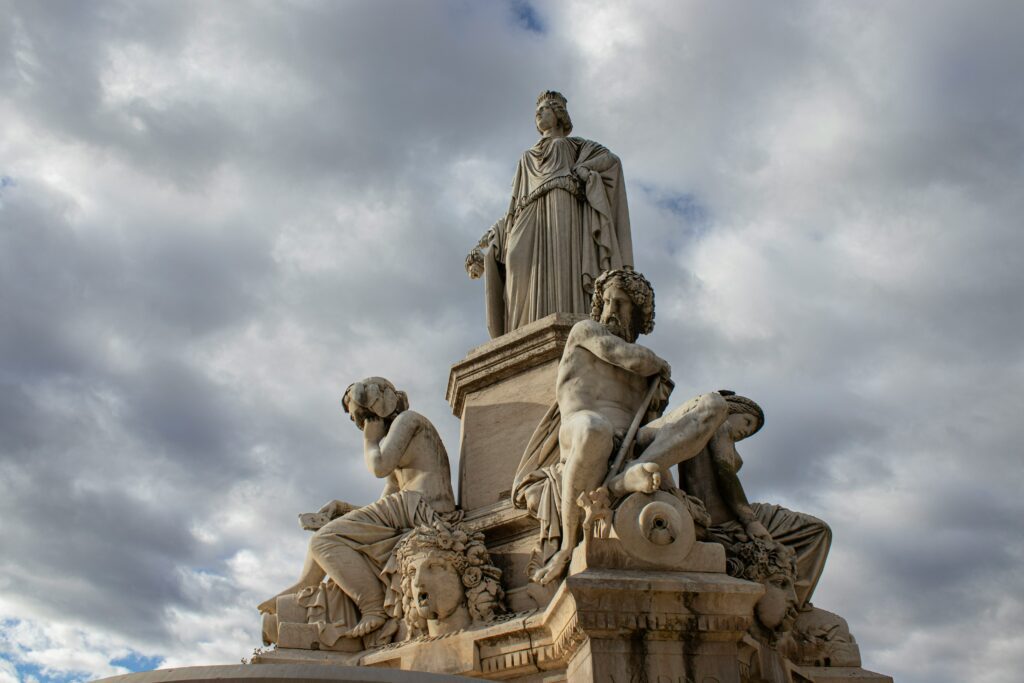From outside of Christianity, it seems to be just another religion. It has a deity to worship, and sacred writings that tell how to please that deity. But, in reality, it is so much more than that. Here is a short comparison that attempts to explain just how much more.
The Scriptures
People think the Bible is a collection of wise sayings, or rules, or random weird thoughts. They compare it to the Koran or the Book of Mormon or the Hindu Vedas or the Buddhist Tipitakas and Sutras. It is so much more than that.
Other Religions’ Scriptures
First, below is a ridiculously over-simplified review of those other four sets of sacred writings. I am definitely not a scholar of the others, so I’m simply listing highlights from a couple of sources to give you a start on any additional research you would like to do.
Koran
Per Mohammed, the text of the Koran is dictation he received from the angel Gabriel between 610 and 632 A.D. It was written down and memorized by 42 scribes, as each section was revealed, on a variety of writing materials. It was collected into a single standardized document by Mohammed’s second- and third-generation successors from those materials plus oral memories. Here are links to an online copy where you can read it for yourself, and to an encyclopedia summary of the history and contents.
Book of Mormon
Per Joseph Smith, this is a book written around the 4th century and inscribed on gold plates. The location of the plates was revealed to Smith by the angel Moroni, who told Smith that the book had been written by his father, Mormon. Here are links to a summary of the Mormon faith, and to an online copy where you can read the book for yourself.
Hindu Vedas
These were written down between 1500 and 500 B.C. but had been passed down orally for many previous generations. From this history site: “Unlike the scriptures of other religions, however, the Vedas are not thought to have been revealed to a certain person or persons at a specific historical moment; they are believed to have always existed and were apprehended by sages in deep meditative states at some point prior to c. 1500 BCE but precisely when is unknown.” Similarly, according to this summary site “Hindus believe that the Vedas transcend all time and don’t have a beginning or an end.” Here is a link to an online copy where you can read them for yourself.
Buddhist Tipitakas and Sutras
These are teachings by founder Siddhartha Gautama (“the Buddha”) who lived in the 5th century B.C. They were conveyed orally for hundreds of years, then first written down in the 1st century A.D. Here are links to a summary of Buddhism, the history of its scriptures, and an online copy where you can read them for yourself.
Now, the Bible
The Bible is a cohesive, detailed, well-attested record of God’s character and His relationship to humans.
- It is set in true history, where it can be cross-referenced to extra-Biblical sources. It gives names, dates, and places that can be verified by archeologists and historians.
- It makes specific predictions, many of which have come true already. Others are waiting for future fulfillment, but there is good reason to expect the 100% accuracy of the past to continue into the future.
- The provenance of the original text and of its transmission far surpasses any other ancient writings. This is true whether speaking of the other sacred texts above, or even of “standard” history such as the life of Socrates, Julius Caesar or Alexander the Great.
- It tells one consistent story, despite being written by multiple authors, in three different languages, over a 1500-year time span. Whether the genre is history, poetry, prophecy, or even simply letters to individuals or churches, all of the books contribute to the same picture of God and His plan for His world.
The article “The Bible, God’s Word” gives a bit more of this evidence, and has links to far more for your further research.
God
People think that God is a watchmaker winding up His world and then leaving it on its own. Or they think of Him as a killjoy, or a vengeful old man looking for an excuse to hurl down lightning bolts. They expect Him to work like Zeus or Brahma or Allah, trading favors for worship depending on His mood. He is so much more than that.
Other Gods
Most religions (although not all) honor some deity (or multiple deities). The “Higher Power(s)” is considered to have authority or control over the fate of mankind. Here again are vastly-oversimplified summaries of some of these Powers.
Greek, Roman, Norse, and Egyptian Gods
The Greek gods, headed by Zeus, each governed their own specific area of interest: Poseidon for the sea and Aphrodite for love, for instance. Roman gods, headed by Jupiter, were similar, and were often based on or influenced by the Greeks. The many Egyptian gods, with Osiris as one of the most honored, also had specialties. So did the Norse, headed by Odin. All of these behaved like humans, with family squabbles, power struggles, and political intrigue.
Hindu Gods
This article gives a summary of ten of the most important Hindu gods, out of thousands of gods worshipped by different sects at different times. Please follow the link for its interesting and valuable information. But until then, here are its descriptions of three major gods:
- Brahma, the Creator: “The Hindu deity Brahma has four heads and four arms. He is usually depicted as human-like, and often with a beard.”
- Vishnu, the Preserver: “Portrayed as human-like, but with blue skin and four arms, each holding an item: the conch, the lotus flower, the chakra/discus, and the mace.”
- Shiva, the Destroyer: “Human-like appearance, but with a third eye. Shiva is usually portrayed with a blue face and throat, but in different variations, his body is either also blue or stark white. He is often depicted with a trident, cobra necklace, and three lines drawn horizontally across his forehead in white ash, known as the vibhuti.”
Each has a female partner. Brahma has Saraswati, Goddess of Education, Creativity, and Music. Vishnu has Lakshmi, Goddess of Wealth and Purity. Shiva has Sati, Goddess of Martial Bliss and Longevity; after her death, she was reincarnated as Parvati, Goddess of Power, Harmony, and Motherhood.
Buddhist Non-God
From this summary site: “Followers of Buddhism don’t acknowledge a supreme god or deity. They instead focus on achieving enlightenment—a state of inner peace and wisdom…The religion’s founder, Buddha, is considered an extraordinary being, but not a god.”
Allah
Among the gods of other religions, descriptions of Allah come the closest to matching the God of the Bible. Etymologically, the word itself (probably from the Arabic “al-Ilāh“) seems to simply mean “the God”, similar to the way “el” or “elohim” mean “god” in Hebrew. “Allah” has come to be treated as a personal name for a specific god, in the way the Bible uses “Jehovah” (or “Yahweh”, “I AM”) for the one true God. In character, the same attributes of omniscience, omnipotence, etc. are ascribed; see here and here for examples.
However, Allah is not described as desiring a personal relationship with individuals, or being willing to sacrifice himself on their behalf. He is emphatically NOT described as a multi-dimensional Trinity of three Persons in One God.
Now, Jehovah “I AM” God
As much as these other gods (or philosophies, in the case of Buddhism) differ from one another, they all have something in common: The potential for human success depends on human effort, and often on the arbitrary whims of the god. This is exactly the point at which they all differ the most from the God of the Bible.
God doesn’t have a special area of interest, as do Zeus, Odin, and the others. He doesn’t have physical form, as do Brahma and Vishnu. However, it is true that He is omnipotent and omniscient, as Allah is described to be.
But unlike Allah or any of the other gods, Jehovah God loves His people. He created them specifically for relationship with Himself, and was willing to give Himself for them. That all-encompassing love is what, more than anything else, distinguishes our God from any other. It leads Him to ascribe righteousness based not on human effort, but on acceptance of that love and sacrifice (John 3:14-17, Romans 3:23-24, Romans 6:23).
Oh, and there is also the fact that our God gives strong evidence of His existence, and the others don’t!
Jesus
Savior
People say that Jesus was a good man, or a good teacher, or a miracle worker. He is so much more than that.
From the first moment that things went wrong, when Adam and Eve chose to distrust God and follow their own inclinations instead of His commands, God promised that one day someone would repair that rift in their relationship. Genesis 3:15 said that a man would crush Satan’s head, at the cost of a “snake bite” to his heel. With His death and resurrection, Jesus fulfilled that promise: Satan no longer has a death grip on humanity.
That resurrection also proved the claims of God to exist, of the Bible to be His Word, and of Jesus to be Him!
Yes, Jesus was a good man and a good teacher. Yes, He did work miracles. But, more than that, He is the living Savior offering reconciliation and eternal life with God.
Messiah
The Jews thought the promised Messiah would be a military leader. Jesus is so much more than that.
In fairness to the Jews who misunderstood Jesus (and those who still do), the Bible does say that the Messiah will lead conquering armies to bring God’s kingdom to earth. An example is Isaiah’s prophecy of a king on David’s throne whose reign will never end (Isaiah 9:6-7).
And Jesus will do so…when He returns to end time and finish fulfilling all remaining prophecies. But He will come not as simply a human military ruler. He will return as the One “by whose wounds we are healed“, as He has already fulfilled in another of Isaiah’s prophecies (Isaiah 52:13-15; Isaiah 53).
The Messiah is prophesied to be both a suffering servant and also an eternal king. The surprise is that He was not both at once: the Servant has come; the King is coming!
So Much More!
Scriptures with more accurate, relevant information; God with more holiness, power, and love; Jesus with more sacrifice, redemption, and salvation. These are the things that convince Christians that what we have is more valuable that anything offered by any other religion.
And the best part is: That gift is offered freely to everyone!


